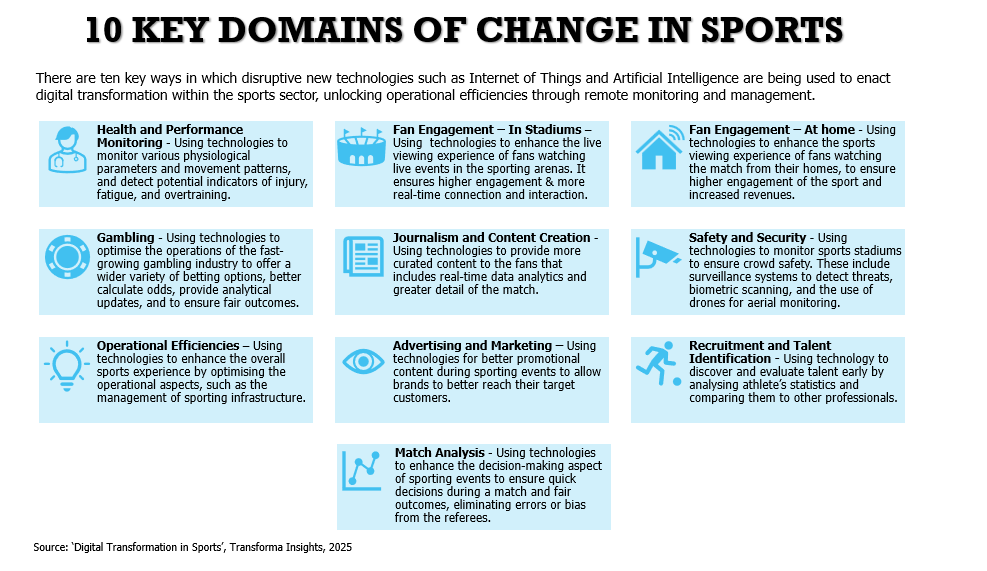This report examines digital transformation (DX) in sports, enabled by the key technology groups that are the focus of Transforma Insights’ research. It focuses on the use of DX in all aspects of sports including stadiums, homes, fans, broadcasters, advertisers, athletes, coaches, scouts, and sports organisations.
This report examines digital transformation (DX) in sports, enabled by the key technology groups that are the focus of Transforma Insights’ research. It focuses on the use of DX in all aspects of sports including stadiums, homes, fans, broadcasters, advertisers, athletes, coaches, scouts, and sports organisations.
Digital Transformation potential in Sports
The sports industry is undergoing rapid change with regular new advances. The innovations are not only attracting more fans but also impact professional athletes, coaches, referees and supporting staff members. Emerging technologies have advanced every aspect of sports ranging from scorekeeping, data analytics, and television to sports medicine and injury prevention. In this report, we discuss the roles played by emerging technologies such as Artificial Intelligence (AI), the Internet of Things (IoT), and augmented and virtual reality (AR/VR) in modernising the sports sector.
Ten key domains of change in sports
Overall, we have identified ten key domains of change in Sports that are enabled by digital transformation. These are discussed in more detail in this document and comprise:
Health and Performance Monitoring, referring to the use of technologies to monitor various physiological parameters (such as heart rate, body temperature, and oxygen saturation) and movement patterns, and detect potential indicators of injury, fatigue, and overtraining. It also involves the use of wearables like GPS trackers, motion sensors, and heart rate monitors that provide real-time insights into physical metrics, enabling personalised training regimes.
Fan Engagement – In Stadiums, referring to technologies being used to enhance the live viewing experience of fans watching live events in the sporting arenas. It ensures higher engagement and more real-time connection and interaction with the match.
Fan Engagement – At home, referring to the use of technologies to enhance the sports viewing experience of fans watching the match from their homes, to ensure higher engagement of the sport and increased revenues.
Gambling, referring to the use of technology to optimise the operations of the fast-growing gambling industry to offer a wider variety of betting options, better calculate odds, provide analytical updates to gamblers for better bets, and ensure fair outcomes.
Journalism and Content Creation, refers to the use of technologies to provide more curated content to the fans that includes real-time data analytics and greater detail of the match, to allow fans to associate themselves more with the sport.
Safety and Security, refers to the use of technologies to monitor sports stadiums to ensure crowd safety. These include surveillance systems to detect threats, biometric scanning, and the use of drones for aerial monitoring.
Operational Efficiencies, refers to technologies being used to enhance the overall sports experience by optimising the operational aspects, such as the management of sporting infrastructure like lighting, creating match-optimum schedules, and enhancing the management of logistics including ticketing, parking, accessibility, and more.
Advertising and Marketing, refers to the use of technologies for better promotional content during sporting events to allow brands to better reach their target customers. It also includes technology being used to optimise sponsorships, in-app advertisements through better fan engagement, and digital advertising during the breaks of sporting events.
Recruitment and Talent Identification, involves using technology to discover and evaluate talent early by analysing athlete’s statistics and comparing them to other professionals. Early talent identification offers teams the advantage of nurturing potential and securing athletes before they gain widespread visibility and their market value rises.
Match Analysis, refers to the use of technologies to enhance the decision-making aspect of sporting events to ensure quick decisions during a match and fair outcomes, eliminating errors or bias from the referees.

Scope
This report examines digital transformation in the Sports sector as enabled by the key technology groups that are the focus of Transforma Insights’ research. These technology groups include:
3D Printing & Additive Manufacturing
Artificial Intelligence
Autonomous Robotic Systems
Data Sharing
Distributed Ledger
Edge Computing
Future Technologies
Human Machine Interface
Hyperconnectivity
Internet of Things (IoT)
Product Lifecycle Management
Robotic Process Automation
Accordingly, the aim of this document is not to chart the future direction of the sports industry, but to highlight the key areas of change, enabled by new and emerging technologies, all of which have been discussed in detail in Section 4 of the report, including an overview of each area, together with analysis of the business impact. We also identify key enabling technologies for each area (from the list above) and provide summary details of illustrative case studies that are available in Transforma Insights Best Practice & Vendor Selection database.
The purpose of the document is to provide a detailed overview of the different ways in which technology is transforming each and every aspect of the sports industry, ranging from stadiums to fans to athletes to organisers and broadcasters. Our analysis of the key technologies that enable each of the identified areas of digital transformation will help vendors of horizontal (technology-specific) capabilities to identify the contexts in which they may secure new business from the Sports sector.
If you have any questions about the content of this report or would like to speak with the author or any other analysts on any topic, you can make use of our Analyst Enquiries service by emailing enquiries@transforminsights.com.